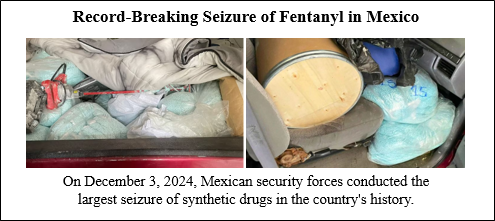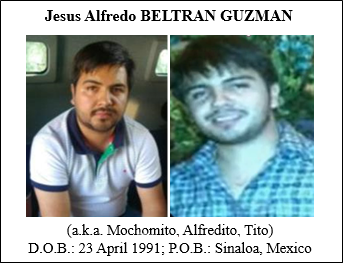WASHINGTON — Today, the U.S. Department of the Treasury’s Office of Foreign Assets Control (OFAC) sanctioned Mexican national Jesus Alfredo Beltran Guzman, a key leader of the Beltran Leyva Organization (BLO), for playing a significant role in the trafficking of illicit drugs, including fentanyl, cocaine, heroin, and methamphetamine, into the United States. One of the most powerful drug trafficking organizations in the world, the BLO is heavily involved in the transportation and distribution of deadly drugs, including fentanyl, to the United States, and has been one of the largest suppliers of cocaine to the U.S. market for over two decades. OFAC carried out this investigation in coordination with the Federal Bureau of Investigation (FBI) and Drug Enforcement Administration (DEA).
“Beltran Guzman and the BLO have continued to operate with violent impunity, trafficking in deadly drugs, threatening communities, and targeting key officials, all while profiting from their criminal schemes,” said Secretary of the Treasury Scott Bessent. “Treasury, in close partnership with our law enforcement colleagues, will continue to disrupt the operations of the cartels and their affiliates that enable the trafficking of deadly drugs like fentanyl across our border and in our communities.”
Additionally, today, the U.S. Department of the Treasury’s Financial Crimes Enforcement Network (FinCEN) issued a Financial Trend Analysis focused on patterns and trends identified in Bank Secrecy Act data linked to fentanyl-related illicit finance.
THE BELTRAN LEYVA ORGANIZATION
Since its inception, the BLO has been considered one of the most violent drug trafficking organizations to operate in Mexico, engaging in shootouts, murders, kidnappings, torture, and violent collection of drug debts to sustain its operations. In December 2009, gunmen killed the family of a Mexican marine following a military raid that killed Arturo Beltran Leyva, a leader of the BLO.
On December 3, 2024, the Mexican Secretariat of Security and Citizen Protection conducted operations in the municipalities of Guasave and Ahome, in the Mexican state of Sinaloa, that resulted in the largest seizure of fentanyl in Mexican history, over a thousand kilos, and the arrests of two leaders of criminal cells linked to the BLO. Mexican officials believe the seizure was equivalent to 20 million doses of fentanyl.

The BLO was sanctioned pursuant to the Foreign Narcotics Kingpin Designation Act (Kingpin Act) in 2008 and Executive Order 14059 (E.O. 14059) in 2021. The BLO is currently led by Fausto Isidro Meza Flores, a.k.a. Chapo Isidro, who was designated by OFAC in 2013 pursuant to the Kingpin Act as well as in 2021 pursuant to E.O. 14059. In February 2025, through its Narcotics Rewards Program, the U.S. Department of State offered a reward of up to $5 million for information leading to the arrest and/or conviction of Chapo Isidro and FBI added Chapo Isidro to its Ten Most Wanted Fugitive List.
“EL MOCHOMITO”
Jesus Alfredo Beltran Guzman (Beltran Guzman), also known as El Mochomito, is the eldest son of Alfredo Beltran Leyva, a U.S.-sanctioned drug trafficker and former leader of the BLO currently serving life in U.S. prison on federal drug trafficking charges. Beltran Guzman is the nephew of Joaquin Guzman Loera, a.k.a. El Chapo, the U.S.-imprisoned head of the Sinaloa Cartel. In 2016, Mexican federal police, working with the Mexican military, detained Beltran Guzman for possession of cocaine with intent to distribute and possession of military-grade firearms. While in prison, Beltran Guzman was accused of torturing and extorting prisoners, as well as continuing to pursue his drug trafficking operations.
Prior to and since his release from prison in 2021, Beltran Guzman, has been involved in the trafficking of cocaine, heroin, methamphetamine, and fentanyl. He has primarily operated in an area known as the Golden Triangle, which includes the Mexican states of Sinaloa, Chihuahua, and Durango. In addition to drug trafficking, Beltran Guzman is believed to be responsible for the December 18, 2024 murder of Halexy Guadalupe, an agent who had served under Mexico’s Secretary of Security and Civilian Protection, Omar Garcia Harfuch.

OFAC designated Beltran Guzman pursuant to E.O. 14059 for having engaged in, or attempted to engage in, activities or transactions that have materially contributed to, or pose a significant risk of materially contributing to, the international proliferation of illicit drugs or their means of production.
SANCTIONS IMPLICATIONS
As a result of today’s action, all property and interests in property of the designated person described above that are in the United States or in the possession or control of U.S. persons are blocked and must be reported to OFAC. In addition, any entities that are owned, directly or indirectly, individually or in the aggregate, 50 percent or more by one or more blocked persons are also blocked. Unless authorized by a general or specific license issued by OFAC, or exempt, OFAC’s regulations generally prohibit all transactions by U.S. persons or within (or transiting) the United States that involve any property or interests in property of designated or otherwise blocked persons.
In addition, persons that engage in certain transactions with the individuals and entities designated today may themselves be exposed to sanctions or subject to an enforcement action. Non-U.S. persons are also prohibited from causing or conspiring to cause U.S. persons to wittingly or unwittingly violate U.S. sanctions, as well as engaging in conduct that evades U.S. sanctions. OFAC’s Economic Sanctions Enforcement Guidelines provide more information regarding OFAC’s enforcement of U.S. sanctions, including the factors that OFAC generally considers when determining an appropriate response to an apparent violation.
The power and integrity of OFAC sanctions derive not only from OFAC’s ability to designate and add persons to the SDN List, but also from its willingness to remove persons from the SDN List consistent with the law. The ultimate goal of sanctions is not to punish, but to bring about a positive change in behavior. For information concerning the process for seeking removal from an OFAC list, including the SDN List, please refer to OFAC’s Frequently Asked Question 897 here and to submit a request for removal, click here.
For more information on the individual designated today, click here.
###
